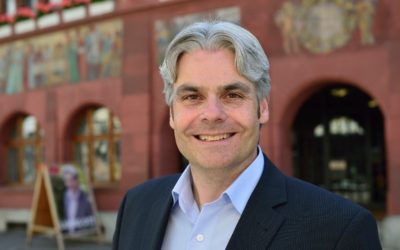About the Conference
Nuclear weapons and climate change create existential threats to humanity and the environment. Federal governments have committed to eliminating both threats – nuclear weapons through the disarmament obligation in the Non-Proliferation Treaty and climate change through the Paris Agreement. However, implementation of these obligations is being prevented by institutional inertia and vested financial interests in the status quo, especially from the fossil fuel and nuclear weapons industries. Corporations involved in the nuclear weapons industry, for example, actively lobby their parliaments and governments to allocate even more funds to nuclear weapons. And they support think tanks and other public relations initiatives to promote the ‘need’ for nuclear weapons to be maintained, modernized and deployed.
Basel Peace Office has joined with other partners in launching Move the Nuclear Weapons Money, a global initiative to cut nuclear weapons budgets and investments, and reinvest these in climate protection, peace and key areas of a sustainable economy, such as education, renewable energy, health, job creation and sustainable development.
One of the most effective tools for non-nuclear governments, cities, universities and civil society is nuclear weapons divestment. Such action puts economic and political pressure on corporations to abandon their involvement in the nuclear weapons industry or convert such production to civilian purposes. Similar divestment from the fossil fuel industry can assist in cutting carbon use and supporting renewable energy.
Already several governments, cities, religious institutions and universities in Europe, USA and globally have adopted nuclear weapons and or fossil fuel divestment policies. These include the Swiss War Materials Act of 2012, Berlin city policy on non-investment in armed warfare, Göttingen university policy of non-investment in fossil fuels or nuclear weapons, Cambridge MA city policy of divesting from nuclear weapons, and the UK Quaker meetings divestment from fossil fuels. Additional impetus for nuclear weapons divestment comes from the 1996 International Court of Justice opinion on nuclear weapons, United Nations adoption of the Treaty on the Prohibition of Nuclear Weapons in 2017 and the UN Human Rights Committee affirmation in October 2018 that nuclear weapons violate the Right to Life as codified in the International Covenant on Civil and Political Rights.
This conference will bring together legislators (mayors, city councilors and parliamentarians), financial managers, and experts in disarmament and climate change to examine successful divestment policies and support their expansion and replication. The conference will also address impact investment and build cooperation to advance related nuclear disarmament policies.
The conference will build upon previous Basel events including a European Regional Meeting of Mayors for Peace and PNND held in January 2019, the 2019 Basel Peace Forum which focused on impact investment, and an international conference in Basel in September 2017 on Human Rights, Future Generations and Crimes in the Nuclear Age.
Participants
Mayors, city officials, parliamentarians, financial managers, policy analysts, experts in nuclear disarmament and climate change, university students and nuclear disarmament campaigners from Europe and North America, with a focus on Switzerland, Germany and France.
Conference languages
- Conference materials will be in English and German.
- Day 1 will be include simultaneous translation in English, German and French.
- Day 2 will be in English and German.
Conference format
The conference will consist of six sessions, two on the afternoon of Friday April 12 and four on Saturday April 13. The Friday sessions will be public and consist of presentations followed by Q&A from the audience. The Saturday sessions will be restricted to conference participants and will be in seminar workshop format.
Registration and conference fees
- Day 1: Public sessions and apero: Free
- Conference Dinner: 70 CHF
- Day 2: 50 CHF (includes refreshments and lunch)
- Full conference: 120 CHF
Registration: Please fill in the Basel conference registration form.
Contacts
Alyn +41 788 912 156
Marzhan +41 766 442 229 info@baselpeaceoffice.org.
Program
Day 1: Friday April 12
2:00pm – 4:00pm
PUBLIC SESSION 1
Rathaus (Town Hall), Marketplatz
Policies to address the threats and impact of nuclear weapons & climate change.
4:30pm – 6:00pm
PUBLIC SESSION 2
Rathaus (Town Hall), Marketplatz
Socially responsible and impact investment. Building a peace economy.
6:00pm
Apero. Rathaus (Town Hall), Marketplatz
7:15pm
Conference Dinner
Zunftsaal Schmeidenhof Banquet Hall,
Day 2: Saturday April 13
9 am – 10:45 am
SESSION 1
Lecture hall 120, Kollegienhaus, University of Basel, Petersplatz 1
Divestment at federal, regional and city levels
11:15 am – 12:30pm
SESSION 2
Lecture hall 120, Kollegienhaus, University of Basel, Petersplatz 1
Divestment in universities, religious institutions and other institutions
12:30 – 1:15pm
Lunch
1:15pm – 2:45pm
SESSION 3
Lecture hall 120, Kollegienhaus, University of Basel, Petersplatz 1
Nuclear risk reduction and disarmament – Mayors for Peace and PNND actions
3:15pm - 4:30pm
SESSION 4
Lecture hall 120, Kollegienhaus, University of Basel, Petersplatz 1
Building the campaign – shifting economics towards peace
4:30pm
CLOSING
Conclusions and follow-up
Speakers
Confirmed speakers include:
- Lukas Ott, Head of Cantonal and City Development Unit, Basel-Stadt Kanton President’s Department;
- General (ret) Bernard Norlain, Former Air Defense Commander (France), Vice-President of Initiatives pour le désarmement nucléaire;
- Cllr Audrey Doig, Member of the Renfrewshire City Council, Vice Chair of Nuclear Free Local Authorities, Scotland;
- Fabian Hamilton MP, UK Shadow Minister for Peace and Disarmament;
- Serge Stroobants, Director of European Operations for the Institute for Economics and Peace and the Global Peace Index;
- Robert Smith, ICV Investment Group;
- Rudolf Rechsteiner, President Ethos Foundation;
- Nishant Malapatti, Financial adviser for Blackrock USA;
- Margret Kiener Nellen MP, Head of Swiss delegation to the OSCE Parliamentary Assembly;
- Bärbel Höhn MP, Chair of the Global Renewables Congress;
- Maaike Beenes, Program officer at PAX Netherlands and researcher for Don’t Bank on the Bomb;
- Chayley Collis, Member of Huddersfield Quakers UK;
- Marc Finaud, Senior Fellow, Geneva Centre for Security Policy;
- Ute Finckh-Kraemer, former Vice-Chair, Bundestag Subcommittee on Disarmament and Arms Control;
- Laurent Goeschel, Executive Director of Swisspeace;
- Andreas Nidecker MD, President of the Basel Peace Office, Board Member of Swiss Physicians for Social Responsibility;
- Quique Sánchez, Project Manager at Centre Delàs, Coordination team member for the Global Campaign on Military Spending;
- Jürgen Grässlin, Spokesman of the campaign Crying out loud – Stop Weapons Exports!, of the German Peace Society (DFG-VK);
- Keith Suter, Member Club of Rome. Foreign Affairs Editor, TV Channel 7 “The Morning Show” (Australia);
- Daniel Rietiker, Lecturer in International Law at the University of Lausanne, President of the Association of Swiss Lawyers for Nuclear Disarmament.
Articles
Lukas Ott, Basel-Stadt Kanton, opens Move the Nuclear Weapons Money conference
Internationale Konferenz: Move the Nuclear Weapons Money 12– 13. April 2019 in Basel Begrüssung Lukas Ott, Leiter Kantons- und Stadtentwicklung Basel-Stadt Sehr geehrte Bürgermeisterinnen und Bürgermeister für den Frieden Sehr geehrte Parlamentarierinnen und...
Reversing the financial interests in fossil fuels and the nuclear arms race
The recent Fridays for Future protests demonstrate a global dissatisfaction with the continuing failure of governments and industry to protect the climate. And the setting of the Doomsday Clock hands to 2 minutes to midnight in January this year indicates a continuing...
International conference on investing for a sustainable future
Money makes the world go around Cabaret by Christopher Isherwood The nuclear weapons and fossil fuel industries are making billions – if not trillions – of dollars fostering a nuclear arms race and destroying the climate. They have a vested financial interest in...
Presentations
Speeches
- General Bernard Norlain; Security without nuclear weapons, initiatives for disarmament. (Original in French. English translation).
- Lukas Ott, Basel-Stadt Kanton commitment to nuclear disarmament and climate protection (in German)
- Dr Daniel Rietiker: Nuclear weapons and the law.
- Prof (em) Andreas Nidecker MD. Nuclear weapons from a medical and social perspective.
- Marc Finaud. What nuclear-weapon possessor states tell us and what we should reply
- Keith Suter. Building a Peace-Industrial Complex
Power point presentations (PDF versions)
- Cllr Audrey Doig. Divestment: the challenge for Councils in England, Scotland & Wales
- Ute Finckh-Krämer. State government divestment: The Berlin experience (in German)
- Serge Stroobants. Peace and its Economic Value
- Rudolf Rechsteiner. Exclusion of nuclear weapons and fossil fuel industries from Swiss pension funds
- Jürgen Grässlin. Preventing exports of weapons to conflict zones
- Maaike Beenes – Lessons from the cluster munitions campaign (accompanying notes)
- Maaike Beenes – Don’t Bank on the Bomb (accompanying notes)
- Chayley Collis – UK Quakers divestment from fossil fuels
Video presentation
- Fabian Hamilton MP, UK Shadow Minister for Peace and Disarmament
Background papers
Conference photos
- Conference photos – facebook album
Organisers and partners
Basel Peace Office (BPO)
A joint initiative of four swiss and four international organisations established to advance research, training and policy-development programs dedicated to international peace, security and global abolition of nuclear weapons. BPO coordinates a number of international programs including the Climate-Nuclear Nexus, Engaging Legislators (PNND), Framework Forum, Humanitarian consequences and the law, Move the Nuclear Weapons Money and UNFOLD ZERO. BPO is a coordinating member of Abolition 2000, the global civil society network to abolish nuclear weapons.
Basel-Stadt Kanton
Basel-Stadt is a city-kanton which straddles the Rheine River at the corner of Switzerland, France and Germany. Basel is known for its contribution to peace including the Basel Peace Congress of Socialists of 24 November 1912 which launched an international declaration opposing war, the 1499 Treaty of Basel which ended the Swabian War, and the 1795 peace agreement between France, Prussia and Spain which was negotiated in Basel. Since 2005, Basel-Stadt has been a member of Mayors for Peace.
PSR/IPPNW Switzerland
The Swiss affiliate of the International Physicians for the Prevention of Nuclear War (IPPNW), a global network of medical professionals (doctors, medical students, other health workers) who share the common goal of creating a more peaceful and secure world freed from the threat of nuclear annihilation.
Mayors for Peace (Europe)
Mayors for Peace is a global network of over 7,700 cities from 163 countries working together to achieve a nuclear-weapon-free world, and to build cooperation between cities on broader peace issues including prevention of war, elimination starvation and poverty, addressing the plight of refugees, human rights abuses, and environmental degradation. Mayors for Peace is led by the Hiroshima Mayor and 26 Lead/Executive cities.
Parliamentarians for Nuclear Non-proliferation and Disarmament (PNND)
A global, cross-party network of legislators from nuclear-armed and non-nuclear countries working to reduce nuclear-weapons risks, prevent proliferation and achieve nuclear disarmament. PNND leaders include current and former presidents, prime ministers, foreign ministers, heads of parliamentary committees and leaders of inter-parliamentary organisations including the Inter-Parliamentary Union and the OSCE Parliamentary Assembly.
World Future Council
A network of leaders from governmental bodies, civil society, business, science and the arts, supported by a staff of policy experts, focusing on effective policies to ensure a sustainable world for future generations.



